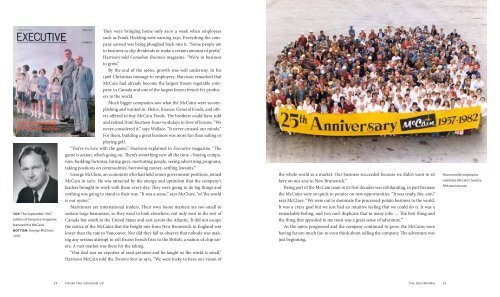From the Ground Up - McCain Foods Limited
From the Ground Up - McCain Foods Limited
From the Ground Up - McCain Foods Limited
Create successful ePaper yourself
Turn your PDF publications into a flip-book with our unique Google optimized e-Paper software.
TOP: The September 1967<br />
edition of Executive magazine<br />
featured <strong>the</strong> <strong>McCain</strong>s.<br />
BOTTOm: George McClure,<br />
1970.<br />
They were bringing home only $100 a week when employees<br />
such as Frank Hickling were earning $150. Everything <strong>the</strong> company<br />
earned was being ploughed back into it. “Some people are<br />
in business to clip dividends or make a certain amount of profit,”<br />
Harrison told Canadian Business magazine. “We’re in business<br />
to grow.”<br />
By <strong>the</strong> end of <strong>the</strong> 1960s, growth was well underway. In his<br />
1968 Christmas message to employees, Harrison remarked that<br />
<strong>McCain</strong> had already become <strong>the</strong> largest frozen vegetable company<br />
in Canada and one of <strong>the</strong> largest frozen french fry producers<br />
in <strong>the</strong> world.<br />
Much bigger companies saw what <strong>the</strong> <strong>McCain</strong>s were accomplishing<br />
and wanted in. Heinz, Imasco, General <strong>Foods</strong>, and o<strong>the</strong>rs<br />
offered to buy <strong>McCain</strong> <strong>Foods</strong>. The bro<strong>the</strong>rs could have sold<br />
and retired from fourteen-hour workdays to lives of leisure. “We<br />
never considered it,” says Wallace. “It never crossed our minds.”<br />
For <strong>the</strong>m, building a great business was more fun than sailing or<br />
playing golf.<br />
“You’re in love with <strong>the</strong> game,” Harrison explained to Executive magazine. “The<br />
game is action, what’s going on. There’s something new all <strong>the</strong> time – buying companies,<br />
building factories, hiring guys, motivating people, seeing advertising programs,<br />
taking positions on commodities, borrowing money, settling lawsuits.”<br />
George McClure, an economist who had held senior government positions, joined<br />
<strong>McCain</strong> in 1970. He was attracted by <strong>the</strong> energy and optimism that <strong>the</strong> company’s<br />
leaders brought to work with <strong>the</strong>m every day. They were going to do big things and<br />
nothing was going to stand in <strong>the</strong>ir way. “It was a sense,” says McClure, “of ‘<strong>the</strong> world<br />
is our oyster.’”<br />
Maritimers are international traders. Their own home markets are too small to<br />
sustain large businesses, so <strong>the</strong>y need to look elsewhere, not only west to <strong>the</strong> rest of<br />
Canada but south to <strong>the</strong> United States and east across <strong>the</strong> Atlantic. It did not escape<br />
<strong>the</strong> notice of <strong>the</strong> <strong>McCain</strong>s that <strong>the</strong> freight rate from New Brunswick to England was<br />
lower than <strong>the</strong> rate to Vancouver. Nor did <strong>the</strong>y fail to observe that nobody was making<br />
any serious attempt to sell frozen french fries to <strong>the</strong> British, a nation of chip eaters.<br />
A vast market was <strong>the</strong>re for <strong>the</strong> taking.<br />
“Our dad was an exporter of seed potatoes and he taught us <strong>the</strong> world is small,”<br />
Harrison <strong>McCain</strong> told <strong>the</strong> Toronto Star in 1975. “We were lucky to have our vision of<br />
<strong>the</strong> whole world as a market. Our business succeeded because we didn’t want to sit<br />
here on our arse in New Brunswick.”<br />
Being part of <strong>the</strong> <strong>McCain</strong> team in its first decades was exhilarating, in part because<br />
<strong>the</strong> <strong>McCain</strong>s were so quick to pounce on new opportunities. “It was ready, fire, aim,”<br />
says McClure. “We were out to dominate <strong>the</strong> processed-potato business in <strong>the</strong> world.<br />
It was a crazy goal but we just had an intuitive feeling that we could do it. It was a<br />
remarkable feeling, and you can’t duplicate that in many jobs … The best thing and<br />
<strong>the</strong> thing that appealed to me most was a great sense of adventure.”<br />
As <strong>the</strong> 1960s progressed and <strong>the</strong> company continued to grow, <strong>the</strong> <strong>McCain</strong>s were<br />
having far too much fun to even think about selling <strong>the</strong> company. The adventure was<br />
just beginning.<br />
34 <strong>From</strong> <strong>the</strong> <strong>Ground</strong> up<br />
t he BeG inninG 35<br />
Florenceville employees<br />
celebrate <strong>McCain</strong>’s twentyfifth<br />
anniversary.






